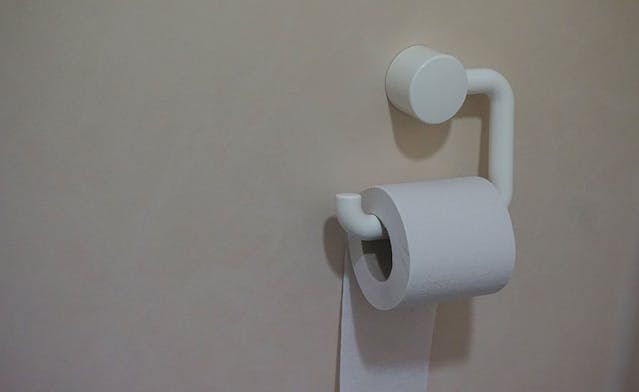
Why do we get diarrhea? We get diarrhea because the body is trying to rid itself of some kind of infection, usually bacterial, viral, or parasitic. Diarrhea is a sign that the body is sick and is trying to fix itself. Diarrhea can also be caused by other illnesses or e, but infections are the most common cause.
The first thing to work out is why diarrhea is such a difficult word to spell. The word was created by Hippocrates and has come into English via Greek, Latin, and French. The original Greek was diarrhoia, which came from “dia” meaning “through” and “rhein” meaning “to flow”. In Latin it was diarrhoea, then diarrie in Old French, where it became diaria in 14th century Old English. That was probably an easier version to spell, but it reverted to the Greek spelling during the Middle Ages and that has stuck. In the UK, it is spelled diarrhoea, and diarrhea in the US. According to researchers, diarrhea (or diarrhoea) is consistently the most difficult word for English speakers to spell because of the “rrh” in the middle. (Interestingly, and not connected to today’s topic, the second most difficult word to spell is “askew”. I find that odd because it is my name. It came into English in the 16th century and meant something that was not level, or was on skew. Skew means to not parallel, or not level. So, on skew, or askew, was something that was not parallel of level. A meaning “on” can also be found in words like “ashore” or “aboard”. Interesting.)
Diarrhea is defined as loose and watery stools that last for one or two days. There is also long-term diarrhea, which can last several weeks, and bloody diarrhea, which can often be the sign of another illness. In developed countries, diarrhea usually goes away after a couple of days and is not much more than a nuisance. In poorer countries though, diarrhea is a major cause of death. Approximately 1.5 million people die because of diarrhea every year and about 500,000 of those are children under 5. Diarrhea is the cause of 9% of all child deaths and about 1,200 young children die of diarrhea every year. This is an appalling statistic because diarrhea is such a simple thing to deal with.
So, why does diarrhea happen? The body reacts to the pathogen that has entered the intestines and introduces more water to attempt to remove it before it can do any damage. When we eat food, it starts to break down in our stomachs before being passed on to the intestines to continue being digested. The food passes out of the stomach into the small intestine, and it is a mix of liquid, stomach acid, food, and water from the body. It is called chyme. As the chyme moves through the small intestine and then the large intestine, water is absorbed from it through the intestinal wall and that water takes nutrients with it into the blood. More and more water is absorbed until the chyme reaches the colon as an almost solid stool. That is what is supposed to happen. When there is a pathogen in the intestine, two molecules called interleukin-22 and claudin-2 are triggered and they change the permeability of the intestinal wall. Instead of absorbing water from the chyme, it goes the other way and lets water pass out into the intestine. This makes the stool much wetter, and it pushes it through and out the intestine very quickly. There was debate about whether diarrhea happens after the pathogen has infected the intestine or before, but experiments in mice have shown that it happens before the pathogens cause any damage, so it appears to be the body’s attempt to remove the pathogen as quickly as possible. There are a lot of medicines that prevent or stop diarrhea, but because diarrhea happens when the body is removing pathogens, stopping it could mean that the infection is worse.
So, why do so many people die from diarrhea? The problem is that when the body forces water into the intestines, salt goes with it as well. If you have access to clean drinking water and salts, diarrhea is no more than an annoyance. If you cannot replace the water and the salt, then death from dehydration is very likely. Half a million children a year die of diarrhea because they cannot replace the water and salts in their bodies. When the water they have to drink is infected with pathogens, that only makes the problem worse. Almost a billion people don’t have access to clean water, and these are the people diarrhea is a problem for. And this is what I learned today.
Photo by hermaion: https://www.pexels.com/photo/white-toilet-paper-191845/
Sources
https://www.imodium.com/diarrhea-treatment/what-is-diarrhea
https://www.hopkinsmedicine.org/health/conditions-and-diseases/diarrhea
https://en.wikipedia.org/wiki/Diarrhea
https://www.walesonline.co.uk/news/uk-news/new-study-shows-diarrhoea-hardest-26520777
https://www.etymonline.com/word/diarrhea
https://www.etymonline.com/word/askew
https://data.unicef.org/topic/child-health/diarrhoeal-disease
https://www.who.int/news-room/fact-sheets/detail/diarrhoeal-disease
https://www.livescience.com/59524-diarrhea-purpose.html
https://www.carygastro.com/blog/does-diarrhea-clean-you-out
https://www.niddk.nih.gov/health-information/digestive-diseases/digestive-system-how-it-works
